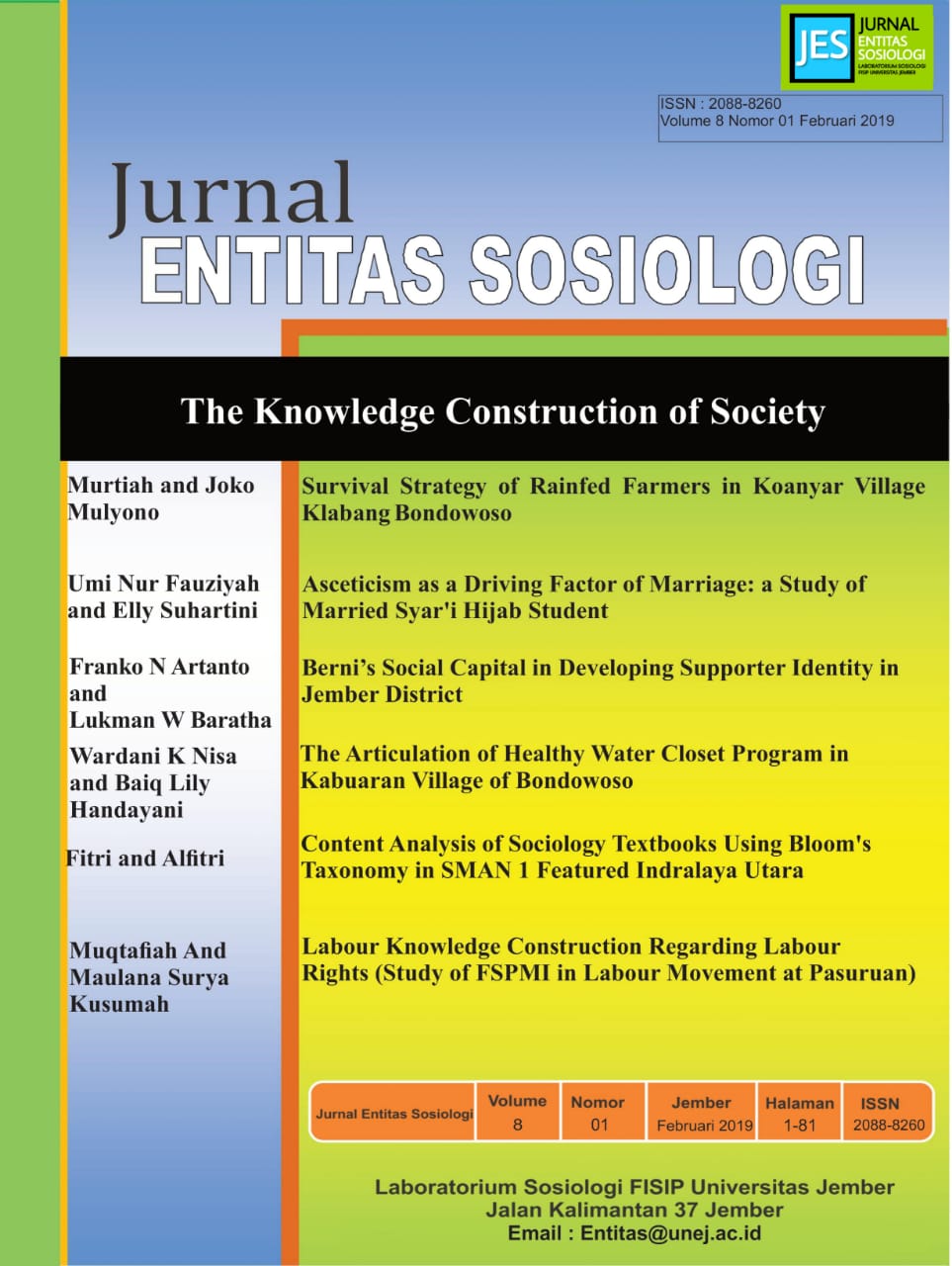Berni's Social Capital in Developing Supporter Identity in Jember District
Abstract
This research focuses on the efforts made by supporters of Berni in establishing her group's identity. By strengthening group solidarity and building networks with various parties, Berni's supporters have the goal of building a supporting character without conflict and making Jember a safe area for all supporters. Researchers use social capital theory to analyze the beliefs, norms, and social networks formed by Berni's supporters. This study uses a qualitative method with an ethnographic approach. The findings of this study include solidarity among members created through activities carried out by supporters of Berni, namely meeting, drinking coffee together, and coming to the stadium to provide support to Persid during the competition. While in the bridging aspect, Berni's supporters have succeeded in building a secure and reciprocal network with various parties such as the management of the Persid Jember club, the regional government, the police, supporters outside the region, and with the community. Berni's supporters also build trust in the broader community by not engaging in clashes or destruction that can disturb the community.
Keywords: social capital, trust, norms, identity.
Referensi:
Afrizal. (2015). Metode Penelitian Kualitatif: Sebuah Upaya Mendukung Penggunaan Penelitian Kualitatif dalam Berbagai Disiplin Ilmu. Jakarta: PT. Raja Grafindo Persada
Hasbullah, J. (2006). Social Capital: Menuju Keunggulan Budaya Manusia Indonesia. Jakarta: MR-United Press
Lucky, N. dan Setyowati, N. (2013). Fenomena Perilaku Fanatisme Suporter Sepak Bola (Studi Kasus Suporter Persebaya Bonek di Surabaya). Jurnal Kajian Moral dan Kewarganegaraan No. 1 Vol. 1. Surabaya: Universitas Negeri Surabaya diakses pada 4 Juni 2018 melalui https://jurnalmahasiswa.unesa.ac.id/index.php/jurnal-pendidikan kewarganegaraa/article/view/1474
Maarif, S. (2011). Bahan Ajar Sosiologi: Kapital Sosial. Yogyakarta: Gress Publishing
Narwoko, J. & Suyanto, B. (2006). Sosiologi: Teks Pengantar dan Terapan.Jakarta: Kencana
Putnam, R. D. (1995). Bowling Alone: American’s Declining Social Capital. Journal of Democracy No. 1 Vol. 6. Maryland: Johns Hopkins University Press diakses pada 17 Oktober 2017 melalui https://muse.jhu.edu/article/16643
Putnam, R. D. (2000). Bowling Alone: The Collapse and Revival of American Community. New York: Simon and Schuster Paperbacks
Soekanto, S. (2013).Sosiologi Suatu Pengantar. Jakarta: Rajawali Pers
Sunoto, H. (2014). Modal Sosial: Definisi, Konsep-konsep Utama Dari Pemikiran Modal Sosial, dan Analisis Terhadap Masalah Kemasyarakatan. Bandung: Sekolah Tinggi Kesejahteraan Sosial diakses pada 29 Maret 2017 melalui https://www.academia.edu/8894781/Modal_Sosial_penjelasan_singkat_para_pakar
Syahra, R. (2003). Modal Sosial: Konsep dan Aplikasi. Jurnal Masyarakat dan Budaya Vol. 5 No. 1. Jakarta: LIPI diakses pada 11 Maret 2018 melalui http://jmb.lipi.go.id/index.php/jmb/article/view/256
Wirawan, A. O. 2014. Berni Pride of The City: Kisah Sebuah Kelompok Suporter Sepak Bola. Jember: Berni











